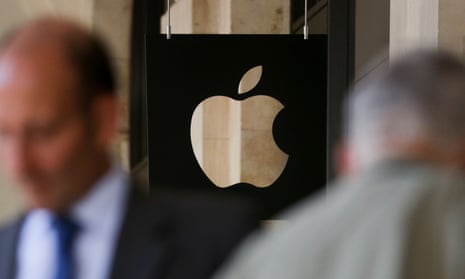Tech giant Apple told shareholders it did not consider the European commission’s decision to collect $14.5bn in back taxes final on Tuesday and was “confident that it will be overturned”, but analysts warned the picture was more complex.
In a note posted to the company’s investor relations page, the company said it did “not expect any near-term impact on our financial results” and that it was prepared to pursue the matter in court for years to come. “While we desire a resolution as soon as possible, the process is likely to take several years,” the company said.
Peter Kenny, senior market strategist at Global Markets Advisory Group, said that it wasn’t clear which side would prevail, ultimately. “There’s no telling whether the verdict will stand on appeal, but we know that the landscape is changing for US corporations in the EU,” he told the Guardian.
“This is just the tip of the spear – it’s an enormously important ruling because it speaks to the EU now shifting the paradigm to tax collection from US-based companies, who have traditionally used the EU as a way of circumventing a higher US corporate tax code.”
But other analysts dismissed the likely impact on Apple, which has more than $200bn in cash on its books. The company’s shares were largely unaffected by the ruling. c
The political fallout from the row also looks likely to continue for months, if not years. The US treasury warned last week that it would “consider potential responses” if the EU pushed ahead with its plans to claw back tax from Apple. A white paper commissioned by US treasury secretary Jack Lew warned that Brussels was overstepping its powers and becoming a “supranational tax authority”.
But there continues to be political controversy in the US over the corporate tax code: some decry high rates of taxation while others say there are too many methods, such as Apple’s Irish tax regime, allowing US companies to move their wealth overseas.
It is not yet clear which side will be backed by either of the 2016 presidential candidates. Republican Donald Trump has broken with conservative orthodoxy by saying he would force US companies, Apple in particular, to move manufacturing jobs within the nation’s own borders, rather than allowing them to seek cheaper labor overseas; he has also said he would lower the US corporate tax rate in order to make sure US companies brought their business back to America.
His Democratic rival, Hillary Clinton, has also hinted that she might lower the corporate tax rate and has said she would move to stop US firms merging with foreign rivals to take advantage of tax loopholes. But she also has closer ties to Apple than Trump. Apple CEO Tim Cook held a fundraiser for Clinton on 24 August.
Apple’s Irish tax affairs were first highlighted by a senators Carl Levin and John McCain in 2013. The duo then led the Senate subcommittee on investigations.
Levin, who now serves on the faculty of Wayne State University Law School in Detroit as distinguished legislator in residence, said: “The royalties Apple collects for its overseas sales of products designed and developed in the US should be taxed in the US. But Apple has avoided the billions of dollars of taxes it owes the US by transferring its intellectual property to itself in Ireland.
“The IRS [internal revenue service] has failed to stake a claim for US taxes on those revenues for a decade or more. It has been passive and so Europe attempts to fill the vacuum. Shame on Apple for dodging US taxes. Shame on the IRS for failing to challenge Apple’s tax avoidance.”

Comments (…)
Sign in or create your Guardian account to join the discussion